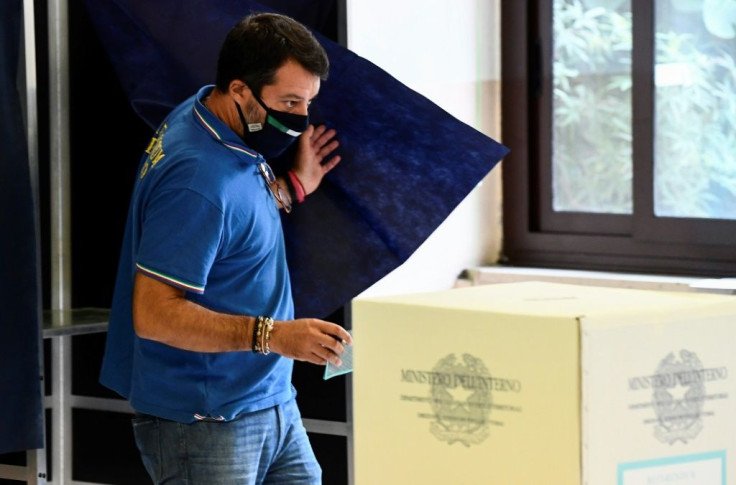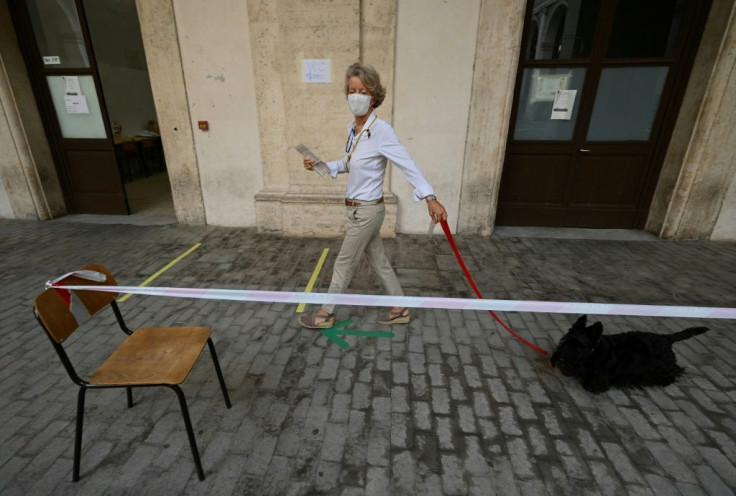Italy's Left Defeats Far-right Bid To Take Stronghold Tuscany
The far-right conceded defeat Monday after a fierce battle in Italy's regional elections for the left-wing bastion of Tuscany, providing a major boost for the fragile national government.
"It's an extraordinary victory," the region's centre-left candidate Eugenio Giani said, as far-right chief Matteo Salvini admitted "we knew it would be an extremely difficult fight".
Experts had warned that a flurry of far-right victories in the elections in seven regions could further fracture the brittle national governing coalition of the centre-left Democratic Party (PD) and its ruling partner, the anti-establishment Five Star Movement (M5S).

The highest-profile battle was for Tuscany, ruled by the left for 50 years.
The left also quashed a bid by the coalition of Salvini's League, Giorgia Meloni's anti-immigration, anti-LGBT Brothers of Italy and Silvio Berlusconi's centre-right Forza Italia to snatch Puglia.
"What could have been elections that hammered the coalition government, that caused it to break apart, have transformed into elections that will allow it to survive and stay the course," the Corriere della Sera's editor in chief Luciano Fontana said.

The two-day vote went ahead despite a threatened resurgence of the coronavirus in Italy, which is now registering more than 1,500 new cases daily.

Ballots were cast nationwide for a referendum on cutting parliament numbers, which passed easily.
But all eyes were on elections held at the same time in Campania, Liguria, Marche, Puglia, Tuscany, Valle d'Aosta and Veneto.
The PD only narrowly frustrated a League bid in January to take Emilia Romagna, one of its biggest strongholds.
A win in Tuscany would have bolstered the right's claim that the uneasy coalition -- not elected, but installed after the previous government collapsed -- was politically weak, and Italy's president should bring forward the 2023 national election.

It would have lifted Salvini to stardom and silenced his rivals for the far-right crown.
His popularity soared when he served as interior minister and deputy prime minister in the last coalition government, pursuing hardline policies that were hostile to immigrants.
But with the collapse of that administration last year and the coronavirus crisis this year his profile -- and his standing in the opinion polls -- has fallen. And Monday's results looked unlikely to lift it again.
"Salvini has been stopped in his tracks. The Tuscans did not fall for his propaganda," Simona Bonafe, the PD's party leader in Tuscany where turnout was 62 percent, was quoted as saying by Florence-based newspaper La Nazione.
The left also easily held Campania in the south.
The right triumphed instead in its strongholds of Veneto and Liguria, as well as taking Marche.
Giani's far-right rival in Tuscany, Susanna Ceccardi, was until recently known only to the inhabitants of Casina, a porticoed town near Pisa, which was the first to turn to the League when she was elected mayor four years ago.
Since then, Renaissance art cities from Pisa to Siena in Tuscany have flipped to the right.
But the region has no glaring problems to drive a protest vote -- the health system has performed well during the Covid-19 pandemic, immigrants are well integrated, and the quality of life is high, political journalist Raffaele Palumbo told AFP.
Roberto Bianchi, contemporary history professor at Florence University, said the right has long tried to woo Tuscany -- to little effect.
"In 2000, a frustrated Berlusconi even launched a campaign to 'de-Tuscanise Tuscany'. It was a disaster," he said.
© Copyright AFP 2024. All rights reserved.











